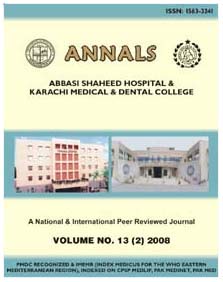| PREGNANCY COMPLICATIONS AND OUTCOMES AMONG OVERWEIGHT AND OBESE WOMEN
ANJUM AFSHAN
ABSTRACT
Objective: The
study aimed to understand the relationship between maternal BMI
and pregnancy complications and outcomes.
Material and Methods: This is a cross sectional
study that was carried out at Sobhraj Maternity Hospital, Karachi
from 1st May 2010 to 30th April 2011. A total of 608 women with
accurate information regarding BMI recorded at booking visit (before
14weeks) and singleton pregnancy with cephalic presentation at 37
weeks or more admitted for delivery were recruited. These women
were studied in three groups according to their BMI at booking visit
(before 14 weeks). Group I included 202 normal weight women with
BMI 20 -24.9, Group II included 202 overweight women with BMI 25
-29.9 and Group III included 204 obese women with BMI > 30. Main
outcomes measured: Maternal adverse outcomes assessed were gestational
diabetes, gestational hypertension, postpartum haemorrhage and wound
infection. Labour outcomes assessed were, risk of postdates, induction
of labour, mode of delivery, meconium stained liquor. Fetal outcome
was assessed by macrosomia, Apgar score <7 at 5 minutes and admission
to NICU. Groups were compared using SPSS version 18 for statistical
analysis. Pearson's chi-square test was used to detect the difference
between the group proportions.
Results: A total of 608 women were studied including
202 normal weight women (BMI 20 - 24.9), 202 overweight women (BMI
25 - 29.9) and 204 obese women (BMI > 30). Compared to women with
normal BMI the following outcomes were significantly more common
in not only obese women but the overweight women were also seen
to be at significantly higher risk for: gestational diabetes, gestational
hypertension, postdates, induction of labour, instrumental delivery
and caesarean section, meconium stained liquor, postpartum haemorrhage,
wound infection, macrosomia, fetal Apgar score <7 at 5 minutes and
admission to NICU. In all cases increasing maternal BMI was associated
with increased magnitude of risk.
Conclusion: Maternal obesity carries significant
risk for the mother and fetus. The risk increases with the degree
of obesity and not only obese but overweight women are at a significantly
increased risk for pregnancy complications and adverse fetomaternal
outcome. Therefore these women should be considered at high risk
and councelled and managed accordingly.
Key Words: Obesity, Pregnancy complications.
|

